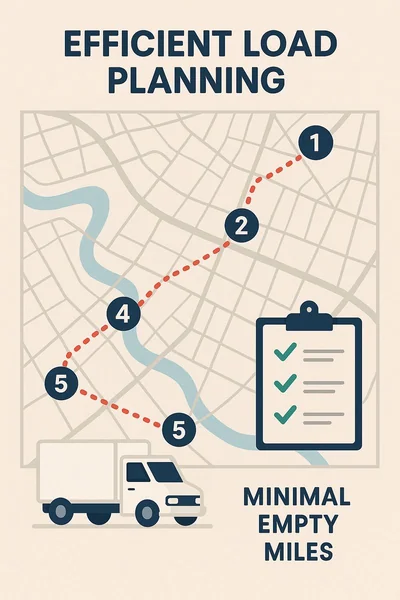Looking to save on car delivery costs? Efficient carrier management is key. This guide shows how YK Freight keeps shipments on time, reduces delays, and lowers fees by managing carriers effectively. Learn practical strategies, from using smart technology to clear communication, that help ensure your vehicle arrives safely and affordably.
Table of Content:
- Why Does Efficient Carrier Management Matter for Your Delivery Costs?
- What Role Does Technology Play in Carrier Management?
- How Can a Good TMS Improve Communication With Carriers?
- What Performance Metrics Should You Track?
- How Should Performance Results Be Shared With Carriers?
- How Do Strong Carrier Relationships Improve Efficiency?
- How Can Consistent Load Planning Reduce Costs?
- What Communication Practices Keep Deliveries on Track?
- How Does YK Freight Ensure Continuous Improvement in Carrier Management?
Why Does Efficient Carrier Management Matter for Your Delivery Costs?
Efficient carrier management may sound like an internal business process, but it directly affects how much you pay for car delivery. When a logistics company works closely with its carriers, communicates clearly, and organizes every step of the shipment, the entire process becomes smoother. And when things run smoothly, customers save money.
For example, if a carrier receives unclear instructions or last-minute updates, they may miss a pickup window or spend hours waiting at a yard. These delays often lead to extra fees — and those fees usually end up added to the customer’s final bill. But when YK Freight manages carriers effectively, these situations become rare. Clear communication and predictable scheduling help carriers stay on time, reducing the chance of avoidable surcharges.
Carrier performance also affects delivery speed. A well-coordinated carrier is more likely to plan their route efficiently, avoid unnecessary detours, and pick up your vehicle when promised. For someone trying to stay within a strict budget, reliable timing helps avoid extra storage charges at the auction yard or additional parking fees.
What Role Does Technology Play in Carrier Management?
Technology is one of the strongest tools in modern logistics, and it plays a huge role in how efficiently carriers can do their job. A well-built Transportation Management System (TMS) helps organize every part of the delivery process — from assigning loads to tracking performance. When the system is simple and intuitive, carriers spend less time figuring things out and more time moving your vehicle.
![]()
YK Freight uses user-friendly tools that make communication effortless. Instead of endless calls or unclear text messages, carriers get all the information they need directly in the system: pickup details, delivery addresses, customer notes, and timing requirements. This reduces the chance of misunderstandings and helps avoid delays that can increase the final delivery cost.
A strong TMS also makes load assignments smoother. Carriers can see available loads, accept them quickly, and receive automatic updates if anything changes. For customers, this means faster pickup times and fewer scheduling issues. When carriers work efficiently, your car gets moved sooner, which helps you avoid extra fees like auction storage charges.
Reporting and data storage are equally important. With technology, YK Freight can track performance in real time — on-time pickups, route progress, and delivery confirmations. This allows the team to spot potential delays early and take action before they become costly problems.
How Can a Good TMS Improve Communication With Carriers?
Clear, fast communication is one of the biggest factors in keeping delivery costs under control. A good Transportation Management System (TMS) gives carriers everything they need right at their fingertips, so they can focus on moving vehicles instead of chasing details.
One of the key features is real-time updates. When a pickup location changes, a gate pass is uploaded, or a customer adds a special note, carriers see it instantly. This helps them avoid common problems like arriving at the wrong lot, missing a pickup window, or waiting for updated instructions — all situations that can lead to extra fees or delivery delays.
EDI integration also plays a major role. Instead of manually entering data or checking multiple systems, information flows automatically between YK Freight and its carriers. This reduces errors, speeds up confirmation times, and ensures everyone is working with the same, accurate information.
Mobile access is another huge advantage. Most carriers spend their day on the road, not behind a computer. When the TMS works smoothly on a phone, drivers can quickly check pickup notes, upload photos, confirm delivery, or update their status without interrupting their schedule. This keeps the job moving and prevents small communication gaps from turning into bigger problems.
What Performance Metrics Should You Track?
Tracking the right performance metrics is essential if you want your deliveries to stay on schedule and within budget. For YK Freight, monitoring carrier performance isn’t about filling out reports — it’s about preventing the small issues that often turn into unexpected costs for customers. The clearer the picture of how each carrier performs, the easier it is to keep the entire delivery process efficient and affordable.
One of the most important KPIs is on-time delivery. When carriers deliver as scheduled, customers avoid extra storage fees at auction yards and don’t have to rearrange their plans. If delays start to appear, tracking this metric helps YK Freight spot patterns early and work with the carrier to fix the root cause before it affects more shipments.
Another key metric is check calls or status updates. These updates allow YK Freight to follow the progress of each vehicle in real time. When a carrier provides accurate, timely updates, the team can notify customers sooner, adjust routes if needed, and prevent surprise delays. When carriers skip updates, it becomes harder to react quickly — which can lead to missed pickups, late drop-offs, or additional charges.
Data accuracy is equally important. This includes correct VIN numbers, pickup and drop-off details, gate pass information, and delivery confirmations. When this data is clean and accurate, the delivery process flows smoothly. When it’s not, mistakes happen — sometimes resulting in reassignments, extra waiting time, or even failed pickups.
How Should Performance Results Be Shared With Carriers?
Sharing performance results with carriers is one of the most effective ways to keep the delivery process running smoothly. When carriers understand exactly how they’re performing — what’s going well and what needs improvement — they can adjust their work in real time. This transparency helps prevent repeated mistakes, reduces delays, and ultimately keeps delivery costs down for customers.
Clear and open reporting creates a sense of joint responsibility. Instead of only the logistics team tracking performance, both sides work toward the same goal: fast, reliable, and affordable vehicle transport. When YK Freight shares on-time delivery rates, accuracy levels, or missed check calls, carriers see how their actions impact the entire chain — including the customer’s final price.
This kind of feedback also builds trust. Carriers appreciate knowing where they stand, rather than guessing or finding out too late that something went wrong. They can correct issues before they grow, which lowers the chance of failures like missed pickups or delays that lead to additional fees.
How Do Strong Carrier Relationships Improve Efficiency?
Strong relationships with carriers are more than just polite communication — they are a key factor in keeping deliveries efficient and costs low. When carriers feel respected and valued, they are far more likely to go the extra mile to meet schedules and handle shipments carefully.
Treating carriers as partners, not just vendors, means offering fair load distribution, timely payments, and clear expectations. For example, if a carrier knows that YK Freight consistently provides enough notice for pickups, assigns loads fairly, and resolves issues quickly, they are motivated to prioritize those shipments. This reduces the risk of last-minute cancellations or delays, which often result in extra fees for customers.
Quick and effective issue resolution is another vital aspect. When a problem arises — such as a delay at the pickup location or missing paperwork — carriers who trust the company will communicate openly, knowing that solutions will be handled professionally. This cooperation prevents minor issues from turning into costly delays.
How Can Consistent Load Planning Reduce Costs?
Consistent and thoughtful load planning is one of the simplest ways to make auto transport more efficient — and to keep costs down for customers. When carriers have a clear schedule and predictable workload, they can plan routes, manage fuel, and organize pickups and deliveries without unnecessary stress. This predictability benefits everyone involved: the carrier, YK Freight, and ultimately, the customer.

One of the biggest cost drivers in auto transport is empty miles — when a carrier travels without a load. By planning loads carefully, YK Freight ensures carriers are moving vehicles on as many miles as possible, reducing wasted trips. This not only lowers fuel costs but also helps carriers accept more loads at reasonable rates, which prevents sudden price increases for customers.
Predictable scheduling also reduces last-minute fees. When a carrier is notified well in advance about pickup times, locations, and any special requirements, they can adjust their route and resources efficiently. This prevents rushed trips, overtime charges, or emergency scheduling that often raises the total delivery cost.
What Communication Practices Keep Deliveries on Track?
Effective communication is the backbone of smooth auto transport. Even the best planning and technology can’t prevent delays if carriers, dispatchers, and customers aren’t on the same page. YK Freight focuses on practical communication habits that keep deliveries on schedule and help budget-conscious customers avoid unnecessary costs.
Quick responses are essential. When a carrier has a question about a pickup location, gate access, or special instructions, getting an immediate answer prevents delays. Slow replies can result in missed windows, waiting time, or even the need to reschedule a pickup — all of which add extra costs for the customer.
Clear instructions are equally important. Every detail, from the vehicle’s VIN and condition to the exact pickup and drop-off addresses, should be precise and easy to follow. Confusing or incomplete instructions often lead to mistakes that take time and money to correct. By providing clear guidance, YK Freight ensures carriers can perform their work efficiently, reducing the chance of errors and delays.
Finally, early notices about changes make a huge difference. Whether it’s a new pickup time, a change in gate procedure, or an updated delivery window, informing carriers as soon as possible allows them to adjust without stress. This proactive approach minimizes disruptions and keeps the delivery process moving smoothly.
How Does YK Freight Ensure Continuous Improvement in Carrier Management?
Continuous improvement is what keeps YK Freight ahead in delivering cars efficiently and affordably. Carrier management is not a one-time setup — it’s an ongoing process of reviewing, learning, and optimizing to make every delivery smoother and more predictable.
The first step is reviewing performance data. YK Freight tracks key metrics like on-time delivery, check calls, and data accuracy for every carrier. By analyzing this information regularly, the team can identify patterns, spot potential issues early, and address them before they impact customers. For example, if a particular route consistently experiences delays, adjustments can be made to improve timing or assign a different carrier with better performance.
Next is updating systems. Technology and tools play a central role in carrier management. YK Freight continuously improves its Transportation Management System (TMS), making sure it stays user-friendly and responsive. New features, mobile access improvements, or enhanced reporting functions help carriers work more efficiently and reduce errors that could increase delivery costs.
Finally, YK Freight focuses on adjusting workflows. This includes refining scheduling practices, improving communication protocols, and creating fairer load distribution. By fine-tuning these processes, carriers can operate more smoothly, complete more deliveries on time, and minimize delays.
Further Reading
What is 3PL Experience? Benefits of Third-Party Logistics
What is Managed Transportation?
What is a Broker in Transportation?
What Types of Freight Carriers Are in Logistics? A Simple Guide for Shipper






ASK YOUR QUESTIONS